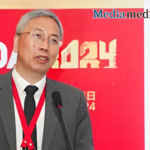
Editor's Note: Upper tract urothelial carcinoma (UTUC), which includes renal pelvis cancer and ureteral cancer, is classified alongside bladder cancer as a type of urothelial carcinoma. However, the overall incidence of UTUC is relatively low, and there are still some contentious issues in its diagnosis and treatment strategies. At the recent 2024 Annual Meeting of the Urological Surgeons Branch of the Chinese Medical Association held in Xi'an, Dr. Hailiang Zhang from Fudan University Shanghai Cancer Center delivered an insightful lecture titled "Systemic Treatment of UTUC: Challenges, Breakthroughs, and Future Directions." Following the conference, Urology Frontier invited Professor Zhang to discuss the characteristics of UTUC patients in China, perioperative treatment strategies, and the progress of his research team.
01 Urology Frontier: How do the characteristics of UTUC patients in China compare with those abroad, and what clinical needs urgently need to be addressed?
Dr. Hailiang Zhang: There are significant differences between Chinese UTUC patients and those from Western countries, mainly reflected in the tumor composition ratios. Studies have found that UTUC accounts for about 5% to 10% of all urothelial carcinomas in Western populations, while in China, this proportion is around 10% to 30%. Furthermore, due to China’s large population, the number of UTUC patients in China far exceeds that in Western countries.
Additionally, most Chinese UTUC patients are already diagnosed with muscle-invasive urothelial carcinoma (MIUC) by the time they seek medical attention. Because the renal pelvis and ureter are narrow spaces, unlike the bladder, which is larger and more elastic, renal pelvis and ureteral cancers are more likely to invade the muscle layer or even penetrate the muscle layer into surrounding organs, leading to locally advanced tumors at stages T2 to T4. Some cases may also metastasize within a short time frame. This is one of the key differences between UTUC and bladder cancer, and there are significant differences in their diagnosis and treatment.
In terms of diagnosis, UTUC is more challenging to diagnose than bladder cancer. Bladder cancer can be detected through cystoscopy, while UTUC requires more complex ureteroscopic examinations. Additionally, diagnosing small lesions in areas such as the renal pelvis and ureter is difficult because biopsy in these locations is challenging or even impossible. Furthermore, detecting UTUC through urinary exfoliative cytology is more challenging than detecting bladder cancer.
Regarding treatment, most UTUC patients present with invasive disease, and often at an advanced stage, making immediate radical surgery infeasible. For bladder cancer patients, effective treatment can often be achieved through transurethral resection of bladder tumors or other minimally invasive methods. However, UTUC lacks such minimally invasive treatment strategies. Currently, radical nephroureterectomy remains the gold standard for treating UTUC, involving extensive surgery that includes removing the kidney, the entire ureter, and a portion of the bladder. Particularly for patients with advanced stages, surgery may only be possible after neoadjuvant therapy. These diagnostic and therapeutic challenges urgently need to be addressed.
02 Urology Frontier: There is still some controversy regarding the perioperative systemic treatment of locally advanced UTUC. What treatment strategy do you recommend?
Dr. Hailiang Zhang: For a long time, UTUC treatment strategies in China have largely referenced bladder cancer guidelines. However, the evidence from evidence-based medicine is not sufficient. Since UTUC has a relatively low incidence, large-scale studies have included fewer patients, and some studies have only performed subgroup analyses or did not include UTUC patients at all. Therefore, it remains unclear whether bladder cancer treatment experiences and strategies can be directly applied to UTUC. Some studies have found that adjuvant immunotherapy for bladder cancer can bring significant survival benefits. However, for UTUC patients, the benefit of immunotherapy has not reached statistical significance. This creates uncertainty when applying bladder cancer treatment strategies to UTUC.
Therefore, there is an urgent need to explore treatment strategies specifically for UTUC patients. This requires collaborative efforts from the UTUC Working Group of the Chinese Medical Association’s Urology Branch to conduct nationwide multicenter clinical studies on UTUC. This will help explore perioperative treatment options for UTUC, especially since there is currently no clear evidence of benefit from neoadjuvant therapy for UTUC. For advanced UTUC, traditional gemcitabine + cisplatin (GC), ADC drugs, chemotherapy combined with immunotherapy, and ADC combined with immunotherapy can achieve significant tumor reduction effects, and some regimens can achieve a high CR rate. If imaging evaluation indicates that surgery is not immediately feasible, neoadjuvant therapy may become the preferred treatment. However, since there is currently no definitive evidence from evidence-based medicine, neoadjuvant therapy can only be provided through relevant clinical studies to ensure patient safety.
03 Urology Frontier: What research has Fudan University Shanghai Cancer Center conducted on UTUC, and what is its significance for improving UTUC clinical practice in China?
Dr. Hailiang Zhang: As the affiliated unit of the Shanghai Urological Tumor Research Institute, the Urology Department of Fudan University Shanghai Cancer Center has conducted several preclinical studies on the diagnosis and treatment of UTUC. Here are some of our research findings. The first study analyzed the mutational spectrum characteristics of the Chinese UTUC population and found differences in the mutation frequency of specific genes in the Chinese population. This study highlights the importance of germline mutation testing in UTUC patients and provides valuable experience for precision treatment and personalized medication guidance for UTUC.
The second study conducted plasma proteomics testing on Chinese UTUC patients and identified protein targets for high-risk and poor-prognosis UTUC patients. We also developed a model to predict progression-free survival in UTUC patients. These findings revealed characteristic gene mutations and protein overexpression in advanced and hereditary UTUC patients, which have certain guiding value for future precision treatment.
In addition, several studies have explored treatment and diagnostic strategies for UTUC patients. One study analyzed a nephron-sparing therapy strategy using ADC combined with immunotherapy as neoadjuvant treatment for UTUC patients with solitary kidneys or impaired renal function. Another study divided advanced UTUC patients into different subgroups, using chemotherapy combined with immunotherapy for PD-1 positive patients and chemotherapy combined with targeted therapy for PD-1 negative patients. Preliminary results showed that these treatment strategies were effective, with a pCR rate of up to 40%. We also conducted gene testing on the urine of over 200 UTUC patients, and the results are currently under further analysis. In the future, this non-invasive testing method is expected to be applied in clinical practice to reduce the burden of invasive procedures (such as cystoscopy and ureteroscopy) and may improve patient prognosis through further molecular marker-based risk stratification.

Dr. Hailiang Zhang
- Chief Physician, Department of Urology, Fudan University Shanghai Cancer Center
- Deputy Director, Department of Urology, Fudan University Shanghai Cancer Center
- Urological Oncology MDT Expert, PhD Supervisor
- Deputy Leader, Minimally Invasive Group, Urological Oncology Committee, China Anti-Cancer Association
- Member, Genetic Tumor Group, China Anti-Cancer Association
- Member, China Medical and Health International Exchange Promotion Association
- Council Member, Shanghai Anti-Cancer Association
- Editorial Board Member, Chinese Edition of Journal of Clinical Oncology (Urology Section)
In recent years, Professor Zhang has published over 120 SCI papers as the first author or corresponding author in journals such as Journal of Hematology & Oncology, Nature Communications, Clinical Cancer Research, Cancer Research, Journal for ImmunoTherapy of Cancer, Hypertension, International Journal of Biological Sciences, and Clinical and Translational Medicine, with some papers being cited over 400 times. He has also published over 20 papers in domestic authoritative core journals.
Professor Zhang has received several awards, including:
- Best Paper Award at the 24th European Urology Annual Meeting
- Multiple invitations to speak at the European Urology Annual Meeting, American Urological Association Annual Meeting, and poster presentations
- Sub-project leader for one major national special fund
- Principal investigator for one National Natural Science Foundation project
- Principal investigator for two Shanghai Natural Science Foundation projects
- Principal investigator for one Science Popularization Innovation Project in Xuhui District, Shanghai
- Key academic contributor to one Shanghai Municipal Science and Technology Commission key research project and one joint research project on major diseases in the Shanghai health system
- Second prize in the Shanghai Science and Technology Progress Award
- First prize in the Ministry of Education Science and Technology Progress Award
- Second prize in the Chinese Medical Science and Technology Award
- Participant in winning the National Science and Technology Progress First Prize


